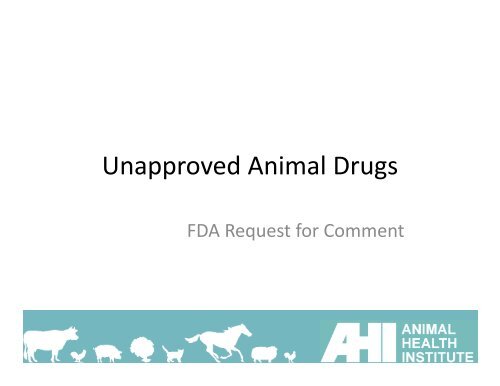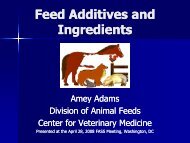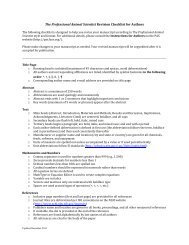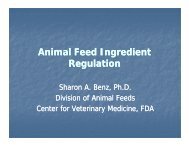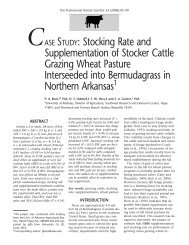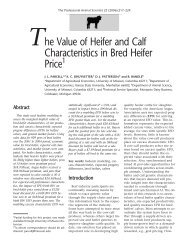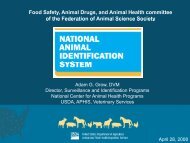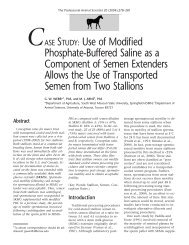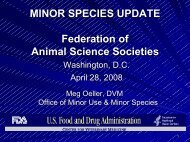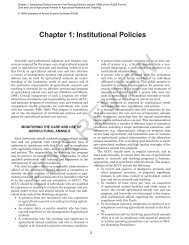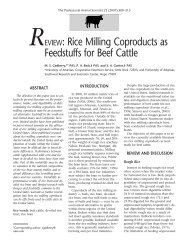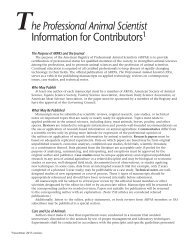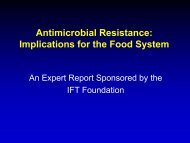Unapproved Animal Drugs Unapproved Animal Drugs
Unapproved Animal Drugs Unapproved Animal Drugs
Unapproved Animal Drugs Unapproved Animal Drugs
You also want an ePaper? Increase the reach of your titles
YUMPU automatically turns print PDFs into web optimized ePapers that Google loves.
<strong>Unapproved</strong> <strong>Animal</strong> <strong>Drugs</strong><br />
FDA Request for Comment
What are unapproved drugs<br />
• Any product labeled or intended for use in the<br />
diagnosis, cure, mitigation, treatment, or prevention<br />
of disease in animals or that affects the structure or<br />
function of the body that is not the subject of a new<br />
animal drug application.<br />
• Any drug that is not a new drug because it is<br />
generally recognized as safe and effective and<br />
therefore does not need to be approved.<br />
• FDA states in the notice that for all practical purposes<br />
unapproved drugs are considered new animal drugs.
<strong>Unapproved</strong> <strong>Drugs</strong><br />
• Longstanding gproblem – many are not classical<br />
pharmaceuticals—virtually all are over the counter with<br />
some exceptions.<br />
• Human drugs are primarily approved as prescription<br />
products or when there is a switch from RX to OTC.<br />
• Most OTC drugs are GRAS/GRAE under monographs<br />
outlining acceptable claims and doses—cough and cold<br />
remedies, topical skin care are some examples.<br />
• CVM approves both OTC and RX new animal drugs‐ there<br />
is no monograph system‐one of the options suggested in<br />
the notice.
Why have these products not been<br />
approved<br />
• Too costly to try and get an approval based on<br />
market return.<br />
• Sponsors don’t consider them to be drugs. No<br />
specific label claim for treating a disease‐ palliative or<br />
supportive therapy.<br />
• Low priority for CVM concern ‐ few if any consumer<br />
complaints about safety or lack of efficacy.<br />
• Can’t really prove they are effective through<br />
controlled efficacy studies.
Types of <strong>Unapproved</strong> Products<br />
• FDA notice:<br />
– Injectable vitamins<br />
– various topical solutions<br />
– shampoos<br />
– liniments<br />
– electrolyte and glucose solutions<br />
– Antidotes<br />
– Anti‐infectives infectives (teat dips)<br />
• No mention of pharmacy compounding but is major AHI<br />
concern.
AHI Comments<br />
• We agree with the goal of CVM to try and increase<br />
the number of approved or legally marketed animal<br />
drugs.<br />
• Existing pathway under 21 CFR 514.1 for submission<br />
and approval of a New <strong>Animal</strong> Drug Application.<br />
• Legalizing the marketing of new animal drugs outside<br />
of this regulation may not assure the safety, efficacy<br />
and quality demanded d dfor approved animal drugs.
Need to preserve products needed by<br />
veterinarians<br />
• Some unapproved drugs are serving a therapeutic<br />
need that is not met by an approved drug.<br />
• Specific compounds that meet a defined<br />
physiological need where there is a clear<br />
deficiency.<br />
• CVM needs to be careful in how they exercise their<br />
authority over some of drugs which are important<br />
to veterinary medicine.
CVM should prioritize drugs of highest<br />
concern<br />
• Drug products with valid scientific basis for<br />
effectiveness<br />
• Those drug products that may present animal or<br />
food safety concern<br />
• Drug products labeled for indications that are in<br />
competition with FDA approved animal drugs<br />
• Drug products containing active ingredients that<br />
have been illegally compounded.
AHI Concerns<br />
• AHI members do not see most types of unapproved<br />
products identified by CVM as competing with<br />
approved animal drugs.<br />
• AHI is very disturbed d about tthe widespread<br />
d<br />
proliferation of compounding pharmacies promoting<br />
and selling numerous unapproved new animal drugs in<br />
clear violation of the FD&C Act.<br />
• AHI strongly opposes any policy which would legalize<br />
compounded medications outside of the strict<br />
provisions of the <strong>Animal</strong> Medicinal Drug Use<br />
Clarification Act (AMDUCA).
Summary<br />
• In summary we have more questions than answers to<br />
the notice.<br />
• Difficult to determine the impact on livestock<br />
industry until FDA identifies products of concern.<br />
• Due to food safety hard to imagine many food animal<br />
products escaping requirement for approval as a new<br />
animal drug‐may be some exceptions for topical<br />
products.<br />
• Main impact would seem to be on equine and<br />
companion animal drugs.
Summary<br />
• We appreciate the desire by the agency to level<br />
the playing field.<br />
• The question is how creative CVM is willing to go<br />
in legalizing these products short of a full blown<br />
NADA approval<br />
• Should not be a double standard for marketing<br />
products except for clear and scientifically<br />
justified exceptions.


